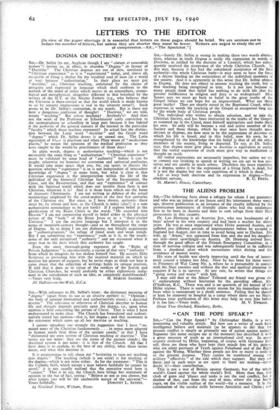Sra,—Surely Dr. Selbie is wrong in making these two words
alterna- tives, whereas in- truth Dogma is really the expression in words of Doctrine, as ratified by the decision of a Council, which has subse- quently received the acceptance of the whole Christian Church. In this way, because it has had the considered acceptance of the final authority—the whole Christian body—it may seem to have the force of a decree binding on the consciences of the individual members of the society. And it is apparently in this sense that Dr. Selbie objects to Dogma. He does not object to anyone teaching the truth, but to that teaching being recognised as true. Is it not just because so many people think that belief has nothing to do with life that the present indifference to religion and duty is so widespread? Miss Sayers says we must go back to belief in the great truths of the Gospel before we can hope for an improvement. What are those great truths? They are shortly stated in the Baptismal Creed, which expresses in words the teaching of the Gospel as recognised long ago by the whole body of Christian people.
The individual who wishes to obtain salvation, and to join the Christian Society, and has been instructed in the truths of the Gospel, as summed up in the Creed, must himself appropriate and make them his own. So only will he become a real and active member of the Society and those things, which he may once have thought mere decrees or dogmas, are now seen to be the expressions of doctrine on which his life is based, and in this belief, now his own, he is strengthened by the knowledge that his belief is that of all the other members of the society, living or departed. To say, as Dr. Selbie says, that dogma must give place to doctrine is equivalent to saying that the verbal expression of truth must give way to meditation or thought on truth.
All verbal expressions are necessarily imperfect, but unless we try to commit our thinking to speech or writing we are apt to lose our- selves and are unable to teach others. Doubtless the mere repetition of a dogma, unless it be the expression of a living faith, is dead, but it is not the dogma but our vain repetition of it which is dead. Let us keep both doctrine and its expression in dogma —Your


































 Previous page
Previous page